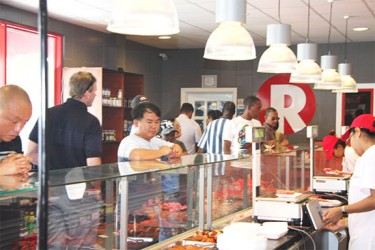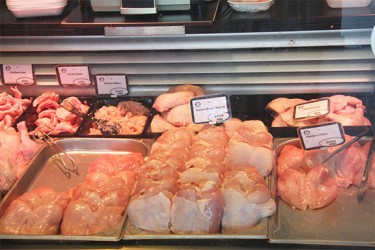A year after Rossignol Butcheries opened at 73/74 Church Street, Georgetown, the enterprise has become one of the more visible urban symbols of investment in Guyana by neighbouring Suriname.
More than that, Humphrey Blom, one of the four Surinamese directors of the company, feels a particular sense of accomplishment over the fact that the enterprise has secured a robust clientele of its own in a relatively short period.
That accomplishment alone has prompted Blom to point to the likelihood of expanding operations, creating additional Rossignol outlets in Georgetown and elsewhere. As yet there is no specific time frame for that particular assignment, though talk of “the next year or two” provides sufficient indication that Blom appears to see a long-term future for Rossignol in Guyana.

Having seemingly targeted expatriates, diplomats and well-off Guy-anese in the first instance, Rossignol has attracted both the attention and the patronage of the other end of the market. Not that the butchers’ stalls in the municipal establishments have been abandoned, but higher than accustomed prices not-withstanding, Rossignol has attracted the patronage of at least some average citizens, What the owners have evidently been banking on is the maxim that people will pay for quality.
Though its Church Street premises is not considered to be the ideal location for a business of its kind, Rossignol has made a compelling public statement.
There is manifest evidence that much work has been put in to attract patrons to the store. Even from the outside, there is a carefully sanitised appearance to the premises and in the absence of a walk-by show window it is still possible to discern the eye-catching display of meats and sausages from the street outside.
Standards apart, Rossignol can make a compelling case for having impacted on local taste. General Manager Regina Low-Koon said Rossignol now stocks a range of seasonings for meat and fish.

Those apart, the company now produces a range of meat products locally, including smoked chicken; sausages, including the popular Chipolata; Chinese sausages, Chinese roast pork and Bloodwurst (a meat-filled black pudding). All of these have quickly become popular with local consumers.
A year ago this newspaper covered the launch of the Rossignol Butchery and a year on it seems that the establishment has grown without fanfare. Truth be told, it would be by no means surprising if the less well-appointed local butcheries have lost ground to Rossignol. Prices may be higher but what Rossignol has done is to present and package meat in a manner that is much more appealing. This example can help rather than hurt the local meat sector.
The transformation may not be complete but with the advent of Rossignol more urban meat-eaters appear to be turning their backs on a culture of butchery characterised by hefty men hacking away at huge sides of beef with bits of meat and bone flying in all directions and customers looking on apprehensively from a discreet distance.
Rossignol is a signal that time has caught up with our local butchery sector, that competition has arrived and that as much to raise standards of service as to ensure their own survival, they must change with the times.
Mind you, Rossignol’s meats are purchased locally; presumably our local butchers have access to that market too. Where Rossignol is concerned, the differences repose in the extent of the investment in plant and equipment, the application of technology and an infinitely greater knowledge of the trade. It is not that the butchery sector has not provided a service over the years. The simple truth is that what the advent of Rossignol has done is to accentuate the need for higher standards in the sector. There may be constraints but that is not an issue that can be avoided.
Last year Rossignol brought with it a skilled European butcher. Evidence of his talents is apparent in the creativity and professionalism reflected in Rossignol’s attractive showcase displays. Local staff, meanwhile, have had the opportunity of securing experience from working alongside more experienced Surinamese workers temporarily assigned to Georgetown,
Rossignol now prepares baked products and other items locally, having initially fetched them from Suriname.
The year has not been without its challenges. Blom said the challenges of cross-border importation can sometimes be tedious. He is, however, sufficiently encouraged to persist.




